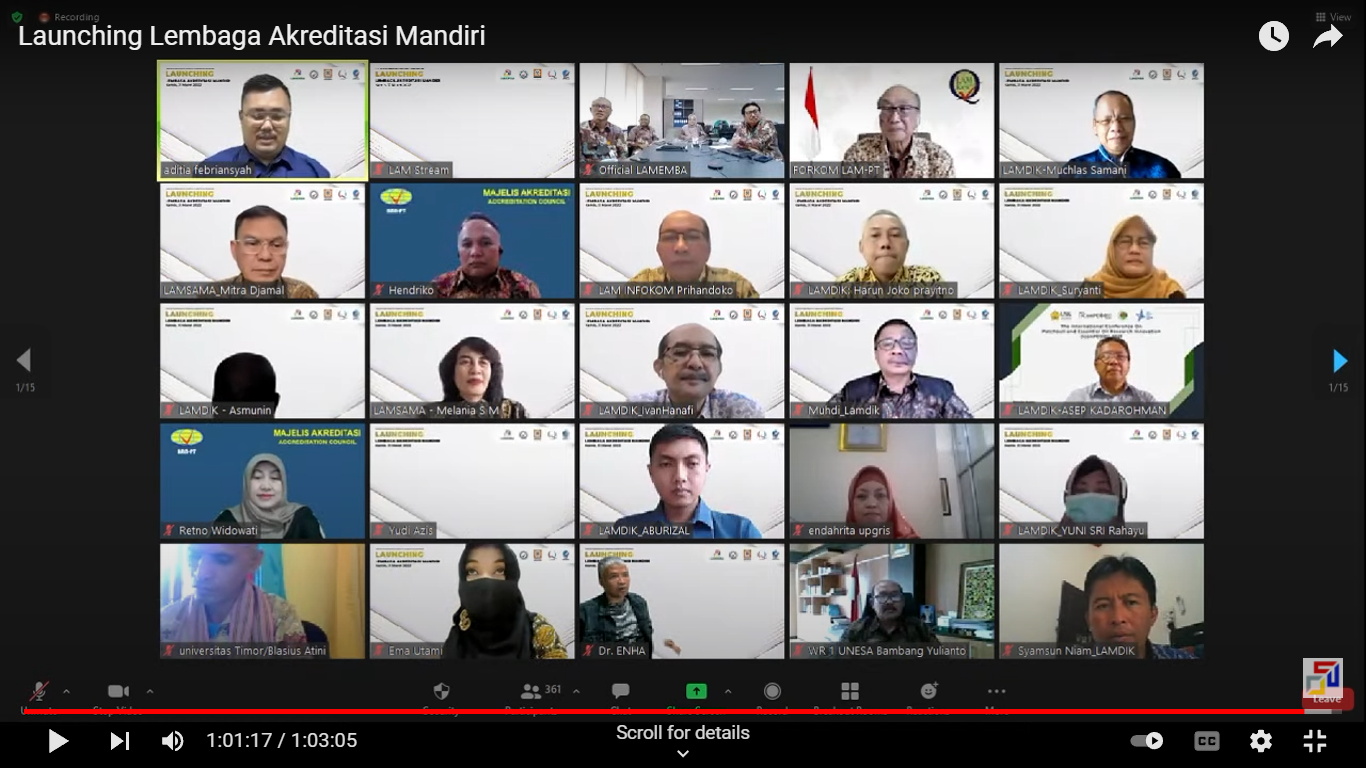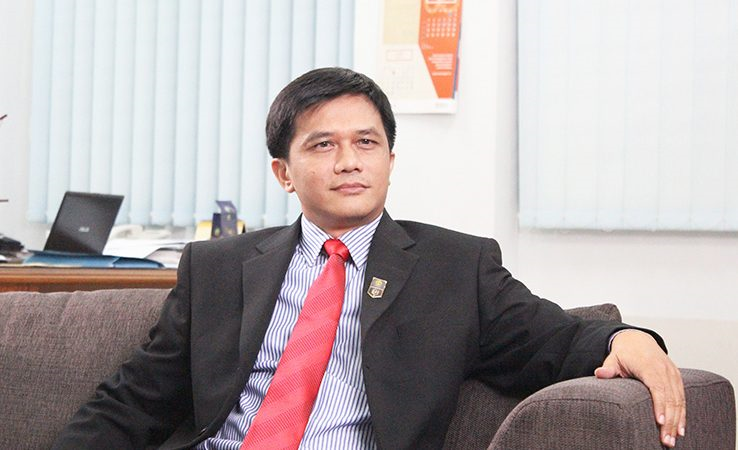

Snapshot of the audience during the launch of the five new accreditation institutions.
The Directorate General of Higher Education, Research, and Technology (Ditjen Diktiristek) of the Ministry of Education, Culture, Research, and Technology of the Republic of Indonesia (Kemendikbudristek) in collaboration with the National Accreditation Agency for Higher Education (BAN-PT) and the Independent Accreditation Institutions (LAM) held the launch of five new LAMs on Thursday (March 31).
These five LAMs include LAM Teknik, LAM Sains Alam dan Ilmu Formal (SAMA), LAM Ekonomi Manajemen Bisnis dan Akuntansi (EMBA), LAM Informatika dan Komputer (INFOKOM), and LAM Kependidikan. They were inaugurated by the acting Director General of Diktiristek, Prof. Ir. Nizam, M.Sc., DIC, Ph.D., IPU, Asean Eng.

LAM Pendidikan Tinggi Kesehatan (PTKes) has already been operational by accrediting health-related fields, making a total of six LAMs in Indonesia.
So far, LAM Teknik will accredit approximately 2,100 study programs, LAMSAMA about 690 study programs, LAM EMBA about 4,000 study programs, LAM INFOKOM about 1,700 study programs, and LAM Pendidikan a total of 4,587 study programs.
With the operation of these six LAMs, the accreditation of higher education institutions will be conducted by the National Accreditation Agency, while Program Study Accreditation as a form of public accountability will be carried out by the Independent Accreditation Institutions.
“This is in accordance with the mandate of Article 55 paragraph 4 of Law No. 12 of 2012,” said Dr. Retno Widowati, M.Si., member of the Accreditation Council (MA) of BAN-PT representing Prof. Dr. Rer. Nat Imam Buchori S.T., the Chairman of MA BAN-PT.
Programs of study that are not covered by the accreditation scope of LAMs will still be accredited by BAN-PT until the establishment of the relevant LAM for those programs of study. Programs of study can also propose program accreditation to the relevant LAM by following the procedures set by the DE BAN-PT.
Moreover, higher education institutions can choose the LAM that will conduct accreditation for study programs that fall within the scope of accreditation of more than one LAM. This is regulated in Regulation of the National Accreditation Agency for Higher Education No. 19 of 2022.
Retno also explained that the operation of LAMs has gone through a lengthy process. From 2016 to 2021, the Accreditation Council of BAN-PT evaluated proposals and provided recommendations by conducting visits to the five LAMs until they were declared ready for operation.
LAMs can operate if they have legal status proven by a notarial deed and approval from the Ministry of Law and Human Rights, have accreditation instruments for programs established by the Accreditation Council of BAN-PT, and receive a list of programs included in the LAM’s scope from Kemendikbudristek through Decree No. 186/M/2021.
LAMs must also have procedures for conducting program accreditation, necessary facilities and infrastructure, an adequate number of assessors, and obtain approval from the relevant minister regarding the fees charged for program accreditation.
Prof. Ir. Nizam, M.Sc., DIC, Ph.D., IPU, Asean Eng., welcomed the new milestone in higher education in Indonesia. “This accreditation process is part of external quality assurance, so the presence of LAM is crucial for study programs,” he said.
Therefore, he emphasized that accreditation standards and norms should be more closely aligned with users, society, and academic groups with the existence of LAM. The presence of LAMs is also expected to accelerate the reflection of dynamic changes in academia, professions, and the working world.
“Two important aspects of the establishment of LAM are quality and relevance,” he continued. The establishment of LAMs is expected to maintain the quality of study programs in Indonesia and ensure their competencies are relevant to current scientific, work, and technological needs.
Nizam also emphasized that LAM should not burden the higher education community but rather contribute to the advancement and improvement of the quality of higher education in Indonesia. According to him, higher education will progress if all institutions are quality-conscious and support the establishment and implementation of LAM.
“May the inaugurated LAMs and those in the preparation stage implement efficient systems and continue to inspire improvements in quality and relevance,” he concluded.
Agreeing with this, Prof. Dr. rer. nat. Abdul Haris, Chairman of the LAMSAMA Accreditation Council, explained that LAM’s performance is expected to provide assurance and quality control for higher education in Indonesia.
“Therefore, the accountability of LAM, manned by stakeholders in higher education, is crucial. LAM’s accountability and independence are controlled by the community, as well as by BANPT and the supervisory board internally,” he said.

Prof. Dr. rer. nat. Abdul Haris, Chairman of the LAMSAMA Accreditation Council.
In addition, Prof. Dr.-Ing. Drs. Ir. Mitra Djamal, IPU, Chairman of the Executive Director of LAMSAMA, stated that LAMSAMA is ready to carry out the accreditation process for natural sciences and formal sciences.
“Hopefully, with the launch of these five new LAMs, the quality of higher education study programs will continue to improve. Support from higher education institutions is highly anticipated for the smooth implementation of accreditation, especially granting permission to their lecturers to become assessors, which will be carried out by each LAM, including LAMSAMA,” he concluded.

Prof. Dr.-Ing. Drs. Ir. Mitra Djamal, IPU, Chairman of the Executive Director of LAMSAMA.